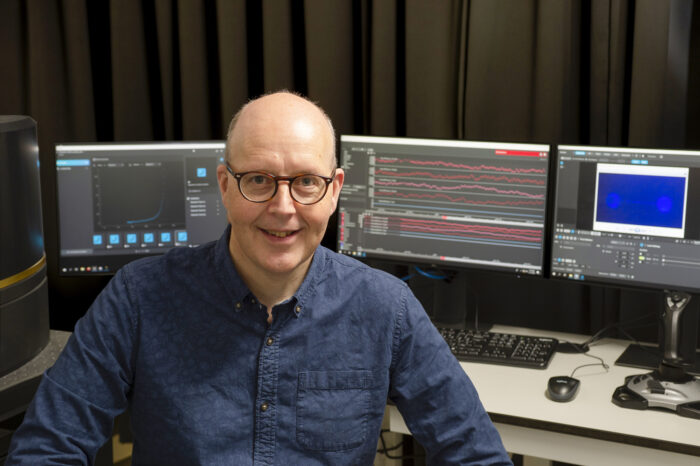
The LMB is delighted to announce that Stephen McLaughlin is now Head of the LMB’s Biophysics Facility, following in the footsteps of Chris Johnson who has led the Facility since 2009. Chris joined the LMB from the MRC Centre for Protein Engineering, tasked with transferring biophysics knowledge and expertise into the LMB and a year later in 2010 Stephen moved from the MRC Cancer Cell Unit to join Chris. Under Chris’s leadership they have established world-class facilities and expertise at the LMB, developed training for researchers, led experiments and provided expertise to the wider scientific community. Stephen has now taken on the day-to-day running and strategic development of the Facility, and Chris will continue to support the team in a part-time training capacity while enjoying semi-retirement.
The Facility applies established theories and methods from physical sciences to address questions in biology. The team have a wide range of specialist instruments which they use to investigate the affinity and dynamics of molecular processes across a scale range from ensembles in solution down to single molecules. Using varying techniques, the facility supports research which probes the hydrodynamic, spectroscopic, thermodynamic and physical properties of biological macromolecules and their interactions.
Each year, the Biophysics Facility hosts a Next Generation Biophysics Symposium in collaboration with AstraZeneca, Imperial College London and the MRC London Institute of Medical Sciences, bringing together scientists from both industry and academia to examine the application of cutting-edge biophysical techniques. The Facility also hosts an annual lecture series on ‘Introduction to Biophysical Techniques’ in which experts from across the LMB are invited to present on the many biophysical techniques available to researchers.
Stephen received a PhD in Biochemistry for studying the structure and active site chemistry of the mammalian protein disulphide isomerase, in Robert Freedman’s group at the University of Kent at Canterbury. He then undertook postdoctoral research at the Universities of Manchester and Cambridge, including a position funded by a Leverhulme Trust Special Fellowship investigating the molecular chaperone Hsp90. Remaining at the University of Cambridge, Stephen became a Research Associate within the Department of Biochemistry, funded by a Wellcome Trust VIP Award where he developed a successful drug screening assay against protein kinases. Before joining the LMB, Stephen took up position as an Investigator Scientist at the MRC Cancer Cell Unit where he worked on reactivating missense mutants of the tumour suppressor, p16INK4a, using structure-stabilising small molecules.
Stephen commented, “I’m excited for the future of Biophysics not only because of how we will support the amazing science happening at the LMB but how the facility will be able to answer questions in new and innovative ways”
Further references
LMB Biophysics Facility
In person return for Next Generation Biophysics Symposium
Next Generation Biophysics Symposium 2022 YouTube playlist
Biophysical Techniques Course 2022 YouTube playlist